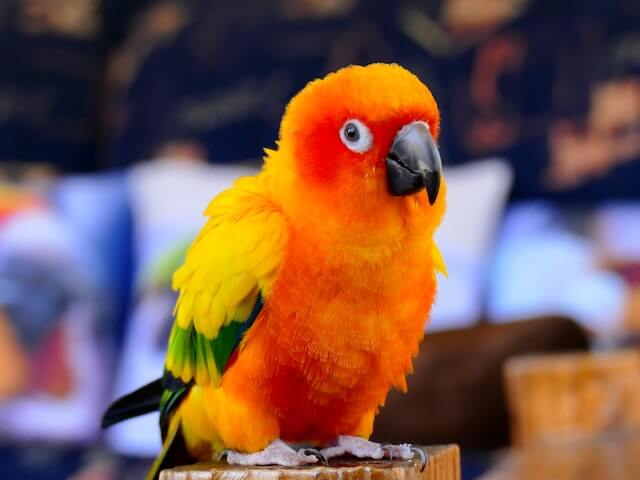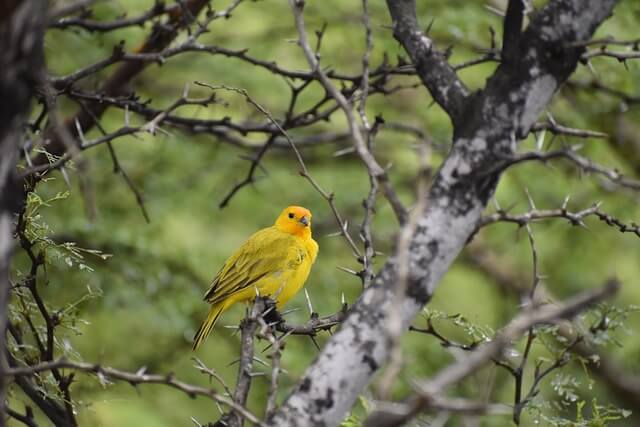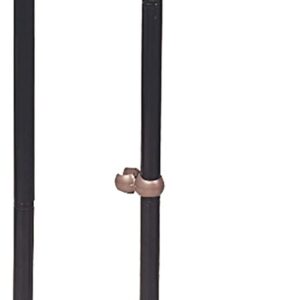The 7 Top Friendly Pet Birds, Essential Tips for Keeping Your Pet Birds Happy and Healthy

Birds can make wonderful pets for those who are looking for an animal companion with unique personalities, playful behavior, and melodious songs. With a vast array of species to choose from, it can be difficult to determine which pet birds make the best pets.
However, some birds are known for their affectionate natures, intelligence, and ease of care, making them ideal choices for first-time bird owners. Some popular choices include the African Grey Parrot, Budgerigar (Budgie or Parakeet), Cockatiel, Conure, Lovebird, and Finch.
Each of these birds has its own distinct traits and personalities, providing endless opportunities for pet owners to form a special bond with their feathered friend.
Here’s a list of some of the best pet birds:
1) African Grey Parrot

This species is well-known for its high intelligence, ability to mimic human speech, and affectionate nature.
2) Budgerigar (Budgie or Parakeet)

Budgies are small, colorful, and active birds that are easy to care for and make great first-time pet birds.
3) Cockatiel

Cockatiels are friendly, social birds that are easy to train and bond with their owners. They also have a unique and soothing whistle.
4) Conure

Conures are playful, curious, and affectionate birds that come in a variety of colors and sizes.
5) Lovebird

Lovebirds are small, highly social birds that are known for their playful and energetic personalities.
6) Finch

Finches are small, active birds that come in a wide range of colors and patterns. They are known for their melodious songs and make great pets for those looking for a low-maintenance bird.
7) Canary
Canaries are known for their beautiful songs and come in a wide range of colors. They are small and easy to care for, making them a popular choice for pet bird owners.

It’s important to note that owning a pet bird is a big responsibility and requires a significant investment of time and resources to provide proper care and housing. Before bringing a bird home, it’s essential to research and understand the specific needs of the species you are interested in, and to ensure you have the resources and commitment to providing a happy and healthy environment for your feathered friend.
Check out Small Pet Sale In The United States 2023
Having a pet bird can bring numerous benefits to your life, including:
- Emotional Support – Birds can provide comfort, companionship, and a sense of purpose for their owners, which can help reduce stress and loneliness.
- Mental Stimulation – Many bird species are highly intelligent and can be trained to perform tricks or learn new behaviors, providing mental stimulation and cognitive benefits.
- Physical Activity – Pet birds require daily exercise and playtime, which can encourage owners to be more active and improve overall health.
- Therapeutic Benefits – Studies have shown that pet birds can have a calming effect on their owners, reducing symptoms of anxiety and depression.
- Environmental Enrichment – Pet birds can provide environmental enrichment by adding natural sounds, bright colors, and playful behavior to their owners’ homes.
- Bonding – Spending time with your pet bird and building a strong bond can deepen your connection and bring joy and happiness to your life.
- Educational Opportunities – Pet birds can provide educational opportunities for children and adults to learn about different bird species, their behavior, and the environment they come from.
It’s important to remember that owning a pet bird is a significant commitment, and it’s essential to provide proper care, housing, and nutrition for your feathered friend. Before getting a pet bird, it’s important to research the specific needs and requirements of the species you are interested in and ensure that you have the resources and commitment to providing a happy and healthy life for your pet.
Here are some precautions to take when having pet birds:
- Safety Concerns – Birds have delicate respiratory systems and can be sensitive to certain fumes and chemicals, such as smoke, cleaning products, and non-stick cookware. To ensure your pet bird’s safety, it’s important to keep the environment free of harmful substances and well-ventilated.
- Proper Housing – Pet birds need spacious, comfortable, and safe living quarters. Cages should be large enough for birds to stretch their wings and move around comfortably and should be cleaned regularly to prevent disease and parasites.
- Diet and Nutrition – Pet birds have specific dietary needs and require a balanced diet of seeds, fruits, vegetables, and other foods to maintain good health. It’s important to research the specific dietary needs of your pet bird and provide a varied and nutritious diet.
- Regular Vet Visits – Pet birds should be taken to a veterinarian regularly for check-ups and to detect any health issues early on. Regular visits can also help maintain your pet bird’s overall health and prevent the spread of diseases.
- Socialization – Birds are social animals and benefit from daily interaction and playtime with their owners. Regular socialization can help strengthen the bond between you and your pet bird and prevent behavioral issues.
- Training – Many bird species are highly intelligent and can be trained to perform tricks or learn new behaviors. Training can provide mental stimulation and help prevent boredom, which can lead to destructive behavior.
- Preventing Bites – Pet birds can bite for a variety of reasons, including fear, aggression, or a lack of trust. It’s important to be patient, gentle, and consistent when handling your pet bird, and to avoid actions that may cause fear or discomfort.
By taking these precautions, you can help ensure that your pet bird has a happy, healthy, and safe life and that you and your pet bird can enjoy a strong and fulfilling relationship for years to come.
The best food for pet birds depends on the species and their specific dietary needs. Here are some general guidelines for feeding different types of pet birds:
- African Grey Parrot – African Grey Parrots require a diet that is high in protein and fat, with plenty of fresh fruits, vegetables, and nuts. Some good food options for this species include pellets, seeds, and fresh foods such as carrots, apples, and almonds.
- Budgerigar (Budgie or Parakeet) – Budgies do well on a diet of high-quality seeds and fresh fruits and vegetables. A commercial pellet-based diet can also be offered, but it should not make up the entire diet.
- Cockatiel – Cockatiels require a balanced diet of seeds, fresh fruits and vegetables, and pellets. Offer a variety of fresh foods, such as carrots, lettuce, and corn, to provide additional vitamins and minerals.
- Conure – Conures require a diet that is high in protein, fat, and fiber, with plenty of fresh fruits, vegetables, and nuts. Offer a variety of food options, such as pellets, seeds, and fresh foods, to provide a balanced diet.
- Lovebird – Lovebirds require a diet that is high in protein and fat, with plenty of fresh fruits and vegetables. Offer a variety of food options, such as pellets, seeds, and fresh foods, to provide a balanced diet.
- Finch – Finches do well on a diet of high-quality seeds and fresh fruits and vegetables. Offer a variety of fresh foods, such as carrots, lettuce, and corn, to provide additional vitamins and minerals.
- Canary – Canaries require a diet that is high in protein and fat, with plenty of fresh fruits, vegetables, and seeds. Offer a variety of food options, such as seeds, fresh foods, and a commercial pellet-based diet, to provide a balanced diet.
It’s important to note that pet birds have specific dietary needs, and it’s essential to research the specific needs of the species you own and provide a balanced and nutritious diet to maintain good health. In addition to a balanced diet, it’s also important to provide clean, fresh water daily, and to change food and water dishes regularly to prevent contamination and disease.
Here are some ideas for providing a comfortable and safe living environment for your pet birds:
- Bird Cages – A spacious bird cage is essential for pet birds, as it provides a secure and comfortable living environment. Choose a cage that is large enough for the bird to stretch its wings and move around comfortably, and that is made of sturdy and safe materials.
- Perches – Pet birds need a place to perch, and there are several types of perches available, including natural wood perches, rope perches, and swings. Offer a variety of perches of different sizes and textures to provide exercise and help keep feet healthy.
- Toys and Play Areas – Pet birds need mental and physical stimulation, and toys and play areas can provide this. Offer a variety of toys, such as mirrors, ladders, and swings, and provide a play area where birds can interact and play with their toys.
- Lighting – Pet birds need exposure to natural light and should have access to sunlight for a few hours a day. Offer a full-spectrum light to provide necessary vitamins and minerals and to regulate the bird’s circadian rhythm.
- Nesting Boxes – Some pet birds, such as parakeets and lovebirds, enjoy having a place to nest and sleep. Offer a sturdy and safe nesting box for the bird to retreat to for rest and privacy.
- Food and Water Dishes – Pet birds need access to clean, fresh food and water daily. Offer food and water dishes that are easy to clean and refill and that are made of safe and non-toxic materials.
- Exercise Areas – Pet birds need space to fly and exercise, so provide an area where they can do so safely. Offer a play area or bird gym where birds can interact and play with toys and perches.
By providing a comfortable and safe living environment, you can help ensure that your pet bird has a happy and healthy life. It’s important to regularly clean and maintain the bird’s living environment to prevent contamination and disease.
Conclusion
In conclusion, pet birds can make wonderful companions for those who are looking for a low-maintenance and interactive pet. With the right care, pet birds can live long and healthy lives, providing their owners with years of enjoyment and companionship. Some of the best pet birds include African Grey Parrots, Budgerigars (Budgies or Parakeets), Cockatiels, Conures, Lovebirds, Finches, and Canaries.
When considering a pet bird, it’s important to research the specific needs of the species and to provide a balanced and nutritious diet, as well as a comfortable and safe living environment. Pet birds also require regular interaction and stimulation, and owners should be prepared to spend time with their birds and provide toys, perches, and play areas for their birds to enjoy.
With the right care and attention, pet birds can be an enjoyable and rewarding addition to any household. If you are looking for a low-maintenance and interactive pet, consider adding a pet bird to your family.



